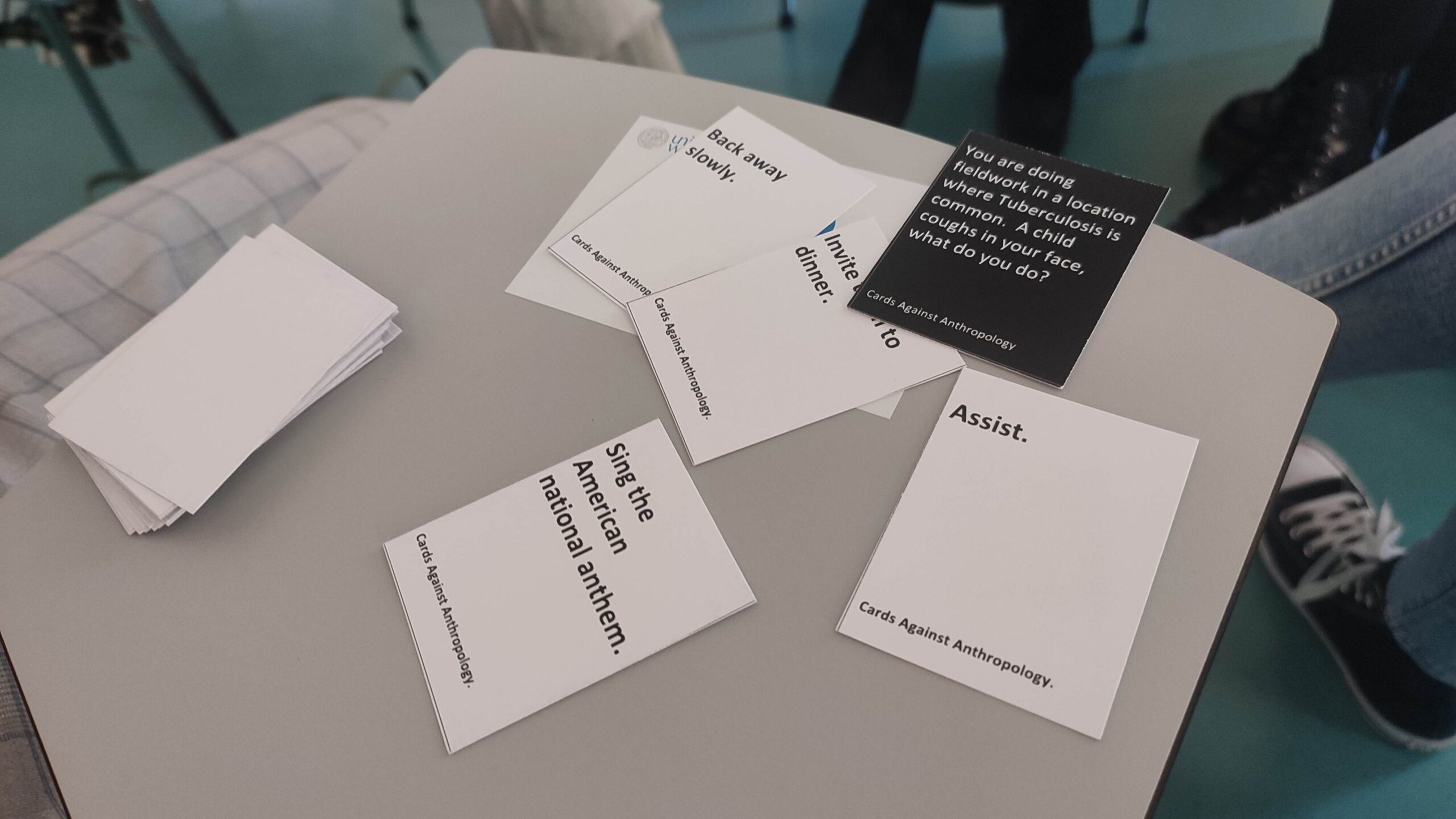Suzana Jovicic and Simone Pfeifer**
In 2014, US-based associate anthropology professor Matthew Durington held a class on game design. One of the anthropology games developed by his students was the card game “Cards Against Anthropology“, based on the classic party game “Cards Against Humanity”. The aim is for players to playfully engage with ethically ambiguous scenarios in ethnographic fieldwork and reflect on their potential responses to these dilemmas.
The scenarios, printed on playing cards, can be easily changed and expanded – as intended by Matthew and his students. Thus, in 2022, we, Suzana Jovicic (University of Vienna) and Simone Pfeifer (University of Cologne) adapted the game for the specific context of digital ethnography: some scenarios were adapted to better fit such fieldwork settings and new scenarios were added. The adapted card was first presented at the Cologne-Siegen Masterclass for Media Ethnography on “(Post)Digital Ethnography: from Participant Observation to Collaborative Approaches”, which took place at the University of Cologne from 24 to 26 November 2022.

In a nutshell, the game consists of amusing but also serious scenario cards (e.g. “An interlocutor steals your phone and runs away, what do you do?”) and reaction cards (e.g, “Scream”, “Run away”, “Invite them to dinner”). The players are divided in groups of 4-7 and seated around a table. One person, posing as a game master, places a scenario card in the middle of the table and distributes several reaction cards to each player. The players choose a reaction card and place it face down on the table. The game master, unaware of who placed which card, examines them and decides which reaction is the best – the winner reveals themselves and receives a point. In the original party game, the “best” card is usually the funniest or most absurd. In this context, however, the game master decides what they consider is the best answer. This is usually followed by a discussion about what one would really do in such a scenario. The role of the game leader is then passed on before a new round begins.
The games (both Cards Against Anthropology and Cards Against Digital Anthropology) can be used for didactic purposes (e.g. to discuss ethical issues in a methods course), especially in preparation for fieldwork. However, as the scenarios included can be adapted, there are no limits to the possible applications. The original cards can be obtained from Matthew Durington, the adapted version “Cards Against Digital Anthropology” can be downloaded below. Have fun!
PDF Download Cards Against Digital Anthropology: Scenario Cards
PDF Download Cards Against Digital Anthropology: Reaction Cards
Acknowledgement
We would like to thank Matthew Durington and his students for sharing the original Cards Against Anthropology Game.*This post is based on: Pfeifer, S., Jovicic, S. (2023). Co-teaching postdigital ethnography. In: Working paper series / SFB 1187 Medien der Kooperation. http://dx.doi.org/10.25819/ubsi/10427
**Suzana Jovicic is a lecturer and ESPRIT (FWF) Fellow at the Department of Social and Cultural Anthropology, University of Vienna. She specialises in digital, design and psychological anthropology, as well as in participatory and interdisciplinary research. She is a co-convenor of the European Network for Psychological Anthropology and a co-founder of the Digital Ethnography Initiative.
Simone Pfeifer is a postdoctoral researcher in the RTG “connecting–excluding: Cultural Dynamics Beyond Globalized Networks“ at the University of Cologne. Her work explores digital and visual media practices in post-migrant societies from a critical perspective. Her previous research focused on transnational social relationships between Senegal and Germany, securitization of Islam, political violence and ethical challenges in ethnographic research.
